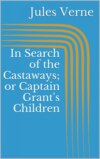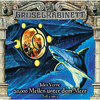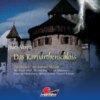Buch lesen: «In Search of the Castaways; or Captain Grant's Children», Seite 4
Chapter VIII.
The Geographer's Resolution
MEANTIME the yacht, favored by the currents from the north of Africa, was making rapid progress toward the equator. On the 30th of August they sighted the Madeira group of islands, and Glenarvan, true to his promise, offered to put in there, and land his new guest.
But Paganel said:
"My dear Lord, I won't stand on ceremony with you. Tell me, did you intend to stop at Madeira before I came on board?"
"No," replied Glenarvan.
"Well, then, allow me to profit by my unlucky mistake. Madeira is an island too well known to be of much interest now to a geographer. Every thing about this group has been said and written already. Besides, it is completely going down as far as wine growing is concerned. Just imagine no vines to speak of being in Madeira! In 1813, 22,000 pipes of wine were made there, and in 1845 the number fell to 2,669. It is a grievous spectacle! If it is all the same to you, we might go on to the Canary Isles instead."
"Certainly. It will not the least interfere with our route."
"I know it will not, my dear Lord. In the Canary Islands, you see, there are three groups to study, besides the Peak of Teneriffe, which I always wished to visit. This is an opportunity, and I should like to avail myself of it, and make the ascent of the famous mountain while I am waiting for a ship to take me back to Europe."
"As you please, my dear Paganel," said Lord Glenarvan, though he could not help smiling; and no wonder, for these islands are scarcely 250 miles from Madeira, a trifling distance for such a quick sailer as the DUNCAN.
Next day, about 2 P. M., John Mangles and Paganel were walking on the poop. The Frenchman was assailing his companion with all sorts of questions about Chili, when all at once the captain interrupted him, and pointing toward the southern horizon, said:
"Monsieur Paganel?"
"Yes, my dear Captain."
"Be so good as to look in this direction. Don't you see anything?"
"Nothing."
"You're not looking in the right place. It is not on the horizon, but above it in the clouds."
"In the clouds? I might well not see."
"There, there, by the upper end of the bowsprit."
"I see nothing."
"Then you don't want to see. Anyway, though we are forty miles off, yet I tell you the Peak of Teneriffe is quite visible yonder above the horizon."
But whether Paganel could not or would not see it then, two hours later he was forced to yield to ocular evidence or own himself blind.
"You do see it at last, then," said John Mangles.
"Yes, yes, distinctly," replied Paganel, adding in a disdainful tone, "and that's what they call the Peak of Teneriffe!"
"That's the Peak."
"It doesn't look much of a height."
"It is 11,000 feet, though, above the level of the sea."
"That is not equal to Mont Blanc."
"Likely enough, but when you come to ascend it, probably you'll think it high enough."
"Oh, ascend it! ascend it, my dear captain! What would be the good after Humboldt and Bonplan? That Humboldt was a great genius. He made the ascent of this mountain, and has given a description of it which leaves nothing unsaid. He tells us that it comprises five different zones—the zone of the vines, the zone of the laurels, the zone of the pines, the zone of the Alpine heaths, and, lastly, the zone of sterility. He set his foot on the very summit, and found that there was not even room enough to sit down. The view from the summit was very extensive, stretching over an area equal to Spain. Then he went right down into the volcano, and examined the extinct crater. What could I do, I should like you to tell me, after that great man?"
"Well, certainly, there isn't much left to glean. That is vexing, too, for you would find it dull work waiting for a vessel in the Peak of Teneriffe."
"But, I say, Mangles, my dear fellow, are there no ports in the Cape Verde Islands that we might touch at?"
"Oh, yes, nothing would be easier than putting you off at Villa Praya."
"And then I should have one advantage, which is by no means inconsiderable—I should find fellow-countrymen at Senegal, and that is not far away from those islands. I am quite aware that the group is said to be devoid of much interest, and wild, and unhealthy; but everything is curious in the eyes of a geographer. Seeing is a science. There are people who do not know how to use their eyes, and who travel about with as much intelligence as a shell-fish. But that's not in my line, I assure you."
"Please yourself, Monsieur Paganel. I have no doubt geographical science will be a gainer by your sojourn in the Cape Verde Islands. We must go in there anyhow for coal, so your disembarkation will not occasion the least delay."
The captain gave immediate orders for the yacht to continue her route, steering to the west of the Canary group, and leaving Teneriffe on her larboard. She made rapid progress, and passed the Tropic of Cancer on the second of September at 5 A. M.
The weather now began to change, and the atmosphere became damp and heavy. It was the rainy season, "le tempo das aguas," as the Spanish call it, a trying season to travelers, but useful to the inhabitants of the African Islands, who lack trees and consequently water. The rough weather prevented the passengers from going on deck, but did not make the conversation any less animated in the saloon.
On the 3d of September Paganel began to collect his luggage to go on shore. The DUNCAN was already steaming among the Islands. She passed Sal, a complete tomb of sand lying barren and desolate, and went on among the vast coral reefs and athwart the Isle of St. Jacques, with its long chain of basaltic mountains, till she entered the port of Villa Praya and anchored in eight fathoms of water before the town. The weather was frightful, and the surf excessively violent, though the bay was sheltered from the sea winds. The rain fell in such torrents that the town was scarcely visible through it. It rose on a plain in the form of a terrace, buttressed on volcanic rocks three hundred feet high. The appearance of the island through the thick veil of rain was mournful in the extreme.
Lady Helena could not go on shore as she had purposed; indeed, even coaling was a difficult business, and the passengers had to content themselves below the poop as best they might. Naturally enough, the main topic of conversation was the weather. Everybody had something to say about it except the Major, who surveyed the universal deluge with the utmost indifference. Paganel walked up and down shaking his head.
"It is clear enough, Paganel," said Lord Glenarvan, "that the elements are against you."
"I'll be even with them for all that," replied the Frenchman.
"You could not face rain like that, Monsieur Paganel," said Lady Helena.
"Oh, quite well, madam, as far as I myself am concerned. It is for my luggage and instruments that I am afraid. Everything will be ruined."
"The disembarking is the worst part of the business. Once at Villa Praya you might manage to find pretty good quarters. They wouldn't be over clean, and you might find the monkeys and pigs not always the most agreeable companions. But travelers are not too particular, and, moreover, in seven or eight months you would get a ship, I dare say, to take you back to Europe."
"Seven or eight months!" exclaimed Paganel.
"At least. The Cape Verde Islands are not much frequented by ships during the rainy season. But you can employ your time usefully. This archipelago is still but little known."
"You can go up the large rivers," suggested Lady Helena.
"There are none, madam."
"Well, then, the small ones."
"There are none, madam."
"The running brooks, then."
"There are no brooks, either."
"You can console yourself with the forests if that's the case," put in the Major.
"You can't make forests without trees, and there are no trees."
"A charming country!" said the Major.
"Comfort yourself, my dear Paganel, you'll have the mountains at any rate," said Glenarvan.
"Oh, they are neither lofty nor interesting, my Lord, and, beside, they have been described already."
"Already!" said Lord Glenarvan.
"Yes, that is always my luck. At the Canary Islands, I saw myself anticipated by Humboldt, and here by M. Charles Sainte-Claire Deville, a geologist."
"Impossible!"
"It is too true," replied Paganel, in a doleful voice. "Monsieur Deville was on board the government corvette, La Decidee, when she touched at the Cape Verde Islands, and he explored the most interesting of the group, and went to the top of the volcano in Isle Fogo. What is left for me to do after him?"
"It is really a great pity," said Helena. "What will become of you, Monsieur Paganel?"
Paganel remained silent.
"You would certainly have done much better to have landed at Madeira, even though there had been no wine," said Glenarvan.
Still the learned secretary was silent.
"I should wait," said the Major, just as if he had said, "I should not wait."
Paganel spoke again at length, and said:
"My dear Glenarvan, where do you mean to touch next?"
"At Concepcion."
"Plague it! That is a long way out of the road to India."
"Not it! From the moment you pass Cape Horn, you are getting nearer to it."
"I doubt it much."
"Beside," resumed Lord Glenarvan, with perfect gravity, "when people are going to the Indies it doesn't matter much whether it is to the East or West."
"What! it does not matter much?"
"Without taking into account the fact that the inhabitants of the Pampas in Patagonia are as much Indians as the natives of the Punjaub."
"Well done, my Lord. That's a reason that would never have entered my head!"
"And then, my dear Paganel, you can gain the gold medal anyway. There is as much to be done, and sought, and investigated, and discovered in the Cordilleras as in the mountains of Thibet."
"But the course of the Yarou-Dzangbo-Tchou—what about that?"
"Go up the Rio Colorado instead. It is a river but little known, and its course on the map is marked out too much according to the fancy of geographers."
"I know it is, my dear Lord; they have made grave mistakes. Oh, I make no question that the Geographical Society would have sent me to Patagonia as soon as to India, if I had sent in a request to that effect. But I never thought of it."
"Just like you."
"Come, Monsieur Paganel, will you go with us?" asked Lady Helena, in her most winning tone.
"Madam, my mission?"
"We shall pass through the Straits of Magellan, I must tell you," said Lord Glenarvan.
"My Lord, you are a tempter."
"Let me add, that we shall visit Port Famine."
"Port Famine!" exclaimed the Frenchman, besieged on all sides. "That famous port in French annals!"
"Think, too, Monsieur Paganel, that by taking part in our enterprise, you will be linking France with Scotland."
"Undoubtedly."
"A geographer would be of much use to our expedition, and what can be nobler than to bring science to the service of humanity?"
"That's well said, madam."
"Take my advice, then, and yield to chance, or rather providence. Follow our example. It was providence that sent us the document, and we set out in consequence. The same providence brought you on board the DUNCAN. Don't leave her."
"Shall I say yes, my good friends? Come, now, tell me, you want me very much to stay, don't you?" said Paganel.
"And you're dying to stay, now, aren't you, Paganel?" returned Glenarvan.
"That's about it," confessed the learned geographer; "but I was afraid it would be inconsiderate."
Chapter IX.
Through the Straits of Magellan
THE joy on board was universal when Paganel's resolution was made known.
Little Robert flung himself on his neck in such tumultuous delight that he nearly threw the worthy secretary down, and made him say, "Rude petit bonhomme. I'll teach him geography."
Robert bade fair to be an accomplished gentleman some day, for John Mangles was to make a sailor of him, and the Major was to teach him sang-froid, and Glenarvan and Lady Helena were to instil into him courage and goodness and generosity, while Mary was to inspire him with gratitude toward such instructors.
The DUNCAN soon finished taking in coal, and turned her back on the dismal region. She fell in before long with the current from the coast of Brazil, and on the 7th of September entered the Southern hemisphere.
So far, then, the voyage had been made without difficulty. Everybody was full of hope, for in this search for Captain Grant, each day seemed to increase the probability of finding him. The captain was among the most confident on board, but his confidence mainly arose from the longing desire he had to see Miss Mary happy. He was smitten with quite a peculiar interest for this young girl, and managed to conceal his sentiments so well that everyone on board saw it except himself and Mary Grant.
As for the learned geographer, he was probably the happiest man in all the southern hemisphere. He spent the whole day in studying maps, which were spread out on the saloon table, to the great annoyance of M. Olbinett, who could never get the cloth laid for meals, without disputes on the subject. But all the passengers took his part except the Major, who was perfectly indifferent about geographical questions, especially at dinner-time. Paganel also came across a regular cargo of old books in the chief officer's chest. They were in a very damaged condition, but among them he raked out a few Spanish volumes, and determined forthwith to set to work to master the language of Cervantes, as no one on board understood it, and it would be helpful in their search along the Chilian coast. Thanks to his taste for languages, he did not despair of being able to speak the language fluently when they arrived at Concepcion. He studied it furiously, and kept constantly muttering heterogeneous syllables.
He spent his leisure hours in teaching young Robert, and instructed him in the history of the country they were so rapidly approaching.
On the 25th of September, the yacht arrived off the Straits of Magellan, and entered them without delay. This route is generally preferred by steamers on their way to the Pacific Ocean. The exact length of the straits is 372 miles. Ships of the largest tonnage find, throughout, sufficient depth of water, even close to the shore, and there is a good bottom everywhere, and abundance of fresh water, and rivers abounding in fish, and forests in game, and plenty of safe and accessible harbors; in fact a thousand things which are lacking in Strait Lemaire and Cape Horn, with its terrible rocks, incessantly visited by hurricane and tempest.
For the first three or four hours—that is to say, for about sixty to eighty miles, as far as Cape Gregory—the coast on either side was low and sandy. Jacques Paganel would not lose a single point of view, nor a single detail of the straits. It would scarcely take thirty-six hours to go through them, and the moving panorama on both sides, seen in all the clearness and glory of the light of a southern sun, was well worth the trouble of looking at and admiring. On the Terra del Fuego side, a few wretched-looking creatures were wandering about on the rocks, but on the other side not a solitary inhabitant was visible.
Paganel was so vexed at not being able to catch a glimpse of any Patagonians, that his companions were quite amused at him. He would insist that Patagonia without Patagonians was not Patagonia at all.
But Glenarvan replied:
"Patience, my worthy geographer. We shall see the Patagonians yet."
"I am not sure of it."
"But there is such a people, anyhow," said Lady Helena.
"I doubt it much, madam, since I don't see them."
"But surely the very name Patagonia, which means 'great feet' in Spanish, would not have been given to imaginary beings." "Oh, the name is nothing," said Paganel, who was arguing simply for the sake of arguing. "And besides, to speak the truth, we are not sure if that is their name."
"What an idea!" exclaimed Glenarvan. "Did you know that, Major?"
"No," replied McNabbs, "and wouldn't give a Scotch pound-note for the information."
"You shall hear it, however, Major Indifferent. Though Magellan called the natives Patagonians, the Fuegians called them Tiremenen, the Chilians Caucalhues, the colonists of Carmen Tehuelches, the Araucans Huiliches; Bougainville gives them the name of Chauha, and Falkner that of Tehuelhets. The name they give themselves is Inaken. Now, tell me then, how would you recognize them? Indeed, is it likely that a people with so many names has any actual existence?"
"That's a queer argument, certainly," said Lady Helena.
"Well, let us admit it," said her husband, "but our friend Paganel must own that even if there are doubts about the name of the race there is none about their size."
"Indeed, I will never own anything so outrageous as that," replied Paganel.
"They are tall," said Glenarvan.
"I don't know that."
"Are they little, then?" asked Lady Helena.
"No one can affirm that they are."
"About the average, then?" said McNabbs.
"I don't know that either."
"That's going a little too far," said Glenarvan. "Travelers who have seen them tell us."
"Travelers who have seen them," interrupted Paganel, "don't agree at all in their accounts. Magellan said that his head scarcely reached to their waist."
"Well, then, that proves."
"Yes, but Drake declares that the English are taller than the tallest Patagonian?"
"Oh, the English—that may be," replied the Major, disdainfully, "but we are talking of the Scotch."
"Cavendish assures us that they are tall and robust," continued Paganel. "Hawkins makes out they are giants. Lemaire and Shouten declare that they are eleven feet high."
"These are all credible witnesses," said Glenarvan.
"Yes, quite as much as Wood, Narborough, and Falkner, who say they are of medium stature. Again, Byron, Giraudais, Bougainville, Wallis, and Carteret, declared that the Patagonians are six feet six inches tall."
"But what is the truth, then, among all these contradictions?" asked Lady Helena.
"Just this, madame; the Patagonians have short legs, and a large bust; or by way of a joke we might say that these natives are six feet high when they are sitting, and only five when they are standing."
"Bravo! my dear geographer," said Glenarvan. "That is very well put."
"Unless the race has no existence, that would reconcile all statements," returned Paganel. "But here is one consolation, at all events: the Straits of Magellan are very magnificent, even without Patagonians."
Just at this moment the DUNCAN was rounding the peninsula of Brunswick between splendid panoramas.
Seventy miles after doubling Cape Gregory, she left on her starboard the penitentiary of Punta Arena. The church steeple and the Chilian flag gleamed for an instant among the trees, and then the strait wound on between huge granitic masses which had an imposing effect. Cloud-capped mountains appeared, their heads white with eternal snows, and their feet hid in immense forests. Toward the southwest, Mount Tarn rose 6,500 feet high. Night came on after a long lingering twilight, the light insensibly melting away into soft shades. These brilliant constellations began to bestud the sky, and the Southern Cross shone out. There were numerous bays along the shore, easy of access, but the yacht did not drop anchor in any; she continued her course fearlessly through the luminous darkness. Presently ruins came in sight, crumbling buildings, which the night invested with grandeur, the sad remains of a deserted settlement, whose name will be an eternal protest against these fertile shores and forests full of game. The DUNCAN was passing Fort Famine.
It was in that very spot that Sarmiento, a Spaniard, came in 1581, with four hundred emigrants, to establish a colony. He founded the city of St. Philip, but the extreme severity of winter decimated the inhabitants, and those who had struggled through the cold died subsequently of starvation. Cavendish the Corsair discovered the last survivor dying of hunger in the ruins.
After sailing along these deserted shores, the DUNCAN went through a series of narrow passes, between forests of beech and ash and birch, and at length doubled Cape Froward, still bristling with the ice of the last winter. On the other side of the strait, in Terra del Fuego, stood Mount Sarmiento, towering to a height of 6,000 feet, an enormous accumulation of rocks, separated by bands of cloud, forming a sort of aerial archipelago in the sky.
It is at Cape Froward that the American continent actually terminates, for Cape Horn is nothing but a rock sunk in the sea in latitude 52 degrees. At Cape Momax the straits widened, and she was able to get round Narborough Isles and advance in a more southerly direction, till at length the rock of Cape Pilares, the extreme point of Desolation Island, came in sight, thirty-six hours after entering the straits. Before her stem lay a broad, open, sparkling ocean, which Jacques Paganel greeted with enthusiastic gestures, feeling kindred emotions with those which stirred the bosom of Ferdinand de Magellan himself, when the sails of his ship, the TRINIDAD, first bent before the breeze from the great Pacific.




















